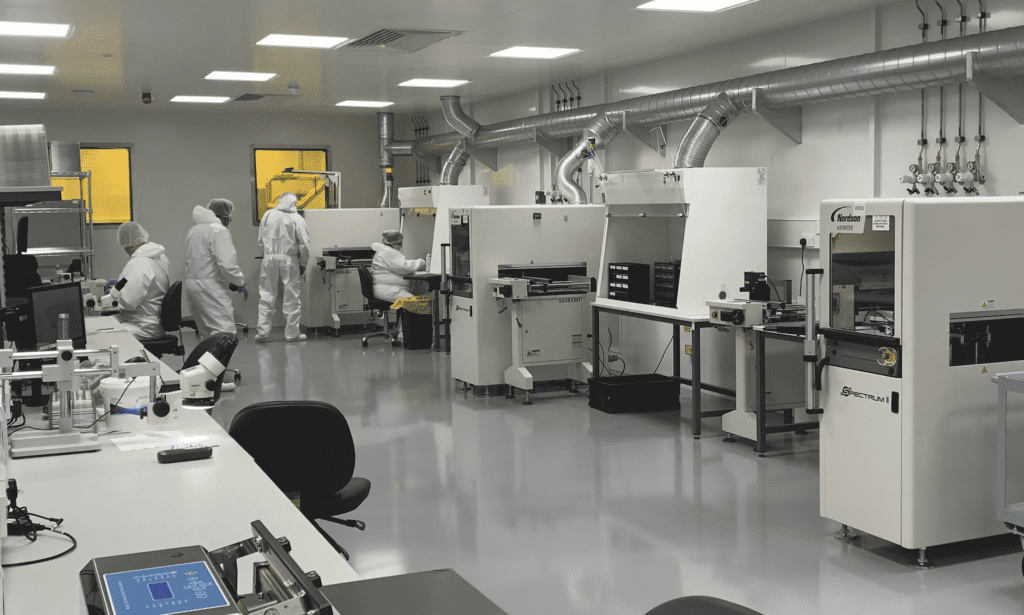In this article, CIL’s managing director, John Boston, explains how advanced technology is being used to return semiconductor manufacturing to the UK.
European OEMs are accustomed to importing semiconductor products, subassemblies and components from Far Eastern suppliers due to their lower staffing andmanufacturing costs. However, problems and threats in Eastern Europe, the Middle East, Red Sea and China mean component sources could disappear or trade routes may become slow, expensive or unavailable. Therefore, governments and industry leaders are exploring domestic self-sufficiency.
Custom Interconnect Limited (CIL) is making a major investment in the plant, equipment and staff needed to back the concept. The company has just opened a new 64,000ft2 site; known as BP2, housing the UK’s largest semiconductor packaging facility. This highly automated factory includes a volume PCBA production area and 15,000ft2 semiconductor packaging ISO7 clean room.
The new BP2 site’s high-volume production capabilities are complemented by the established CIL House facility, which houses a dedicated rapid prototype SMT PCBA line and a further five production SMT PCBA lines for small to medium volumes of complex PCBA assemblies.
The combined facilities let CIL support customers throughout their entire product lifetime: initial concept development/ prototyping; early low/ medium volume production runs; and on to full high- volume production.
In one major project, CIL is the lead on GaNSIC—a project stemming from UKRI’s Driving the Electric Revolution challenge and brings together CIL and the Compound Semiconductor Applications Catapult. It is set to develop novel ways of applying silver sinter pastes to wide band-gap (WBG) semiconductors such as silicon carbide (SiC) and gallium nitride (GaN) devices to optimise their thermal coupling and solve complex power module assembly challenges.
So how is CIL competing with Far Eastern suppliers in delivering complex, high-quality components/assemblies in large quantities, on time and competitively? The answer lies in high levels of automation. When a production line needed 20 technicians on European wages to operate successfully, the wage bill ruled out competitiveness with the Far East. This problem becomes insignificant at CIL’s level of automation, where a complete line is run by just two operators.
While reducing labour costs, automation has also improved throughput, from 500 hand-built semiconductor assemblies a week, to a current automated rate of 4,500 a week. Other key aspects are product quality, machine reliability and uptime. Chances of inadequacy or failure are reduced by investing in quality equipment but it’s an inescapable reality that no machine is immune to failure. If a failure does happen, the supplier’s response is critical. With downtime costing £80,000 per day, plus risk of reputation damage, repairs must be made in minutes or, at worst, hours.
Suppliers also play a crucial role in ensuring CIL staff are correctly trained and supported, to coax optimal performance out of production lines. CIL has simplified its drive to shorten supply lines and bring semiconductor manufacturing back to the UK by consolidating suppliers. The production, testing and inspection machines they buy are advanced technology, so finding and managing numerous suppliers offering, delivering and supporting suitable solutions is challenging.
A supplier who can offer all the manufacturing/inspection equipment across a production line is well placed to understand how the machines interact and optimise the process accordingly.
Having supplied CIL for 16-years, the IPP Group ticks all the boxes. The Group has delivered Nordson Asymtek automated precision fluid dispensing systems for glob top encapsulation with very tight tolerance during semiconductor assembly, plus Vitronics Soltec reflow soldering ovens for the PCBA lines. These are drawn from its range of SMT and post-SMT manufacturing equipment, materials and consumables for electronics production lines, and backed by 40 years’ experience of process development and installation.
For inspection, CIL has purchased a Nordson Dage Quadra 5 x-ray machine, plus a Nordson Sonoscan Gen7 SAM acoustic microscope previously, and a new Quadra 7 Pro x-ray machine, all from Cupio, now part of the IPP Group.
The Quadra 5 x-ray (with CT scan capability) and SAM acoustic microscope comprise an integrated inspection capability which lets CIL reliably perform their high-precision silver sintering die attachment process, used in manufacturing WBG semiconductor assemblies. The SAM’s high resolution complements the Quadra 5’s imaging detail.
IPP’s acquisition of Cupio brings in Cupio Services (CS), which covers consultancy, training, technical support and inspection services for its range of inspection equipment. CS investigates issues within components, plus SMT mounting problems. For example, it can check for delamination, BGA balling and broken wires inside components, plus PCB tracks and component to PCB connections. Root cause analysis is possible, even for equipment
not supplied by IPP.
CIL’s managing director, John Boston said: “CIL’s ultimate strategy is to maximise and optimise our offering of prototype, small, medium and high-volume PCBA and micro-electronics/power device assembly, all from one company. We have a planned growth trajectory across diverse industries and market conditions.
“Expansion will continue, with two more SMTA production lines planned for BP2 in 2024, and further development in 2025. Also, over the coming years we will be adding further semiconductor packaging technologies and processes to give our customers the technological lead they need to be successful.
“I’m looking forward to continuing our close relationship with the IPP Group. We have built up solid relationships with their key staff and trust their expertise and commitment to delivering on their promises.
“We turn to them not only for supply of new equipment, but also for their valuable training and advice on how we can continue improving and getting the most out of our production and inspection equipment capabilities. Now, the consolidation of the IPP Group and Cupio will make both purchasing and technical support more efficient and easier to manage than ever.
“Overall, we are very proud of our BP2 investment, and how it is allowing us and our customers to counter the ever- increasing worldwide threat to our supply chain integrity. We also believe that our story will be encouraging to other UK electronics manufacturers, as we have proved that it’s possible to reduce dependence on overseas semiconductor suppliers.”

